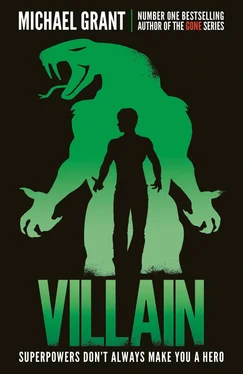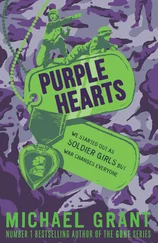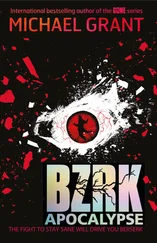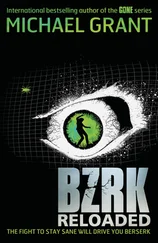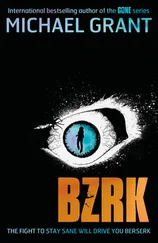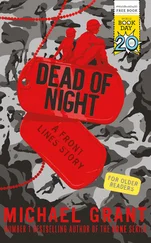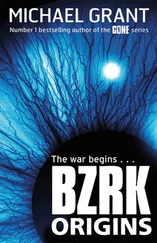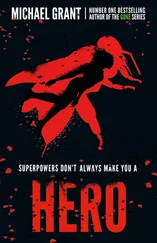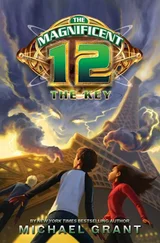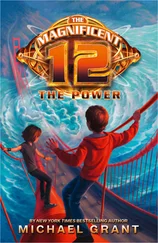The fire had exposed the tendons of his wrist. Most of his face was untouched, but a burn spread from his neck up the left side of his head, so that his ear had melted and now lay flat, a sort of bas-relief of itself. His face, as well as most of his chest and private bits, was intact aside from spot burns. The unburned bits were like islands floating in a magma sea.
One thing was clear: no one—not a single nurse, doctor, or specialist—had any doubt that Malik would die, probably within hours.
So Cruz had made the solution of water and pulverized meteor fragments that carried an engineered alien virus with the power to disassemble and reassemble DNA like a kid playing with Legos. The rock, as it was called, had created the Perdido Beach Anomaly, the place survivors of that impossible dome called the FAYZ.
The rock had turned Tom Peaks, ruthless government bureaucrat, into a massive, liquid fire–spewing beast; the rock had turned an obnoxious-if-talented young artist named Justin DeVeere into the armored, sword-armed monster called Knightmare; the rock had turned a disturbed young man named Vincent Vu into the vile creature that called itself Abaddon.
This was also, of course, the rock that had given Shade her power, and Cruz hers. No one could predict what the rock would do to Malik. No one could be certain it would do anything at all. But the alternative was to simply wait for him to die, either screaming in agony or in a coma from which he would never wake. So Cruz had run down to the hospital cafeteria to get a straw so he could drink, and held it to his trembling lips.
Malik had swallowed all he could. And then he had fallen and fallen and fallen into hell, because taking the rock had meant turning off the morphine drip so that he could swallow without choking, and within seconds, as he felt the gritty water slide down his throat, the pain rose beneath him like a tidal wave, like some terrifying volcanic eruption, an irresistible force.
The rock changed those who consumed it, but how would it manifest in Malik? The alien virus was clever, subtle, and opportunistic. It had used the DNA of Dekka Talent’s own cat to shape Dekka’s morphed self. It had used starfish DNA to grow Vincent Vu into a monster. But the rock had other tricks as well—it had turned Tom Peaks into a fearsome creature that was surely not the product of any earthly DNA, but rather a creature of half-remembered movies whose images lay buried in Peaks’s memory. And an unfortunate child in Islay, Scotland, had been transformed into a creature from a children’s board book, a creature that had had to be annihilated by shells from a Royal Navy destroyer.
Cruz herself, formerly known as Hugo Rojas before she’d come to accept the fact that “Hugo” was simply never going to be authentic as a male, had acquired a power that had no analogy in nature: she could appear as anyone. Anyone she had seen, or even seen video of. She had only to form a picture in her mind, and as if she was some sort of overhead projector, she could reflect and embody that image. Nature was brilliant at disguise and could make an insect look like a leaf, but nothing in nature matched what Cruz could do.
Had the rock virus used her own gender transition as a text in creating the morphed Cruz? It would almost imply that the virus had a sense of humor.
Cruz had stayed in morph for hour after hour while Malik was in the hospital, playing various roles, shifting her appearance with increasing ease and speed. And for all of those hours she had endured the vile, insinuating attentions of the Dark Watchers, those voiceless, faceless, formless observers who emerged any time a morphing happened. At times it was like being whispered to by a pervert—not words, just slithering, leering tones. At times she felt she could almost glimpse them. Like when you suddenly turn your head and have the feeling that you just missed seeing something out of the corner of your eye.
Shade Darby had come and gone several times. She would stand by Malik’s bed, talk in quiet tones to Cruz, wince at Malik’s pain, and brush tears away with quick, impatient gestures, as though her tears were an irritation. Eventually Shade managed to convince an exhausted, emotionally wrecked Cruz to come with her to their latest stolen vehicle in the hospital parking lot and eat something, and hopefully sleep. She settled Cruz into the passenger seat of the Mercedes and tucked a woolen throw around her, like she was putting a child to bed. Shade turned on the engine and the seat warmers, and despite being sure she could not sleep, Cruz did just that. After several hours Cruz woke from a troubled sleep and found Shade sitting in the driver’s seat, opening a Subway bag.
“I have an Italian cold cut and a ham and cheese. Also chips.”
Cruz said nothing, but pushed open the door, leaned out, and vomited onto the concrete.
Without a word, Shade handed her a bottle of water. Cruz swirled and spit, then drank the entire bottle and dropped the empty. Then she took the Italian cold-cut sub, wolfed down half of it, swallowed, and mumbled, “Thanks.”
Shade nodded and looked away.
This was a new Shade Darby. Cruz had always seen her strange, brilliant, ruthlessly determined friend as two people in one body: there was the pretty, vaguely punk-looking girl with the interesting scar up one side of her neck. That Shade Darby was amused, kind, a bit distant but supportive. Then there was what Cruz thought of as the shark: the cold, calculating young woman with the brilliant mind.
This was a different girl, neither easygoing Shade nor the shark. This was a wounded Shade, an uncertain Shade. A girl who had made decisions that destroyed her relationship with her only surviving parent, dragged Cruz into a life of felonies piled upon felonies, and, finally, left Malik screaming in unbearable agony, a charcoal and melted-flesh version of the boy Shade had once loved and been loved by.
“How are you?” Shade asked, practically cringing, as if she expected Cruz to berate her.
But as Shade had come to recognize the damage she had done, Cruz had come to accept her own complicity. No one had put a gun to her head to force her to follow Shade. Cruz had been the new kid in school, a mid-semester transfer after being kicked out of a Catholic school for wearing dresses. Evanston, Illinois, was still a bastion of relative tolerance, but the nastiness that had come to be a part of American life, even at the highest levels, had threatened her. Until Shade. Shade’s friendship had spread an umbrella of safety over Cruz at school, and Cruz had leaped at the chance to have a friend. She had quickly seen that Shade was obsessed with the death of her mother on the day of the Perdido Beach Anomaly four years earlier, when the FAYZ dome had fallen. And Cruz knew that Shade’s head was filled with fantasies of revenge against the monstrous being called Gaia who had used her powers for slaughter. But Cruz knew as well that Shade’s revenge fantasies were just that, fantasies. No one can get revenge on a dead thing, and Gaia, that evil child, had died, destroyed in the end by the courage and sense of justice of an autistic child called Little Pete, and the charming sociopath Caine.
And yet, step by step, Cruz had gone along with Shade. She had chosen to take the rock herself, to become Rockborn. She had then acquired and learned to use a superhuman power. And she had raised nothing but the most token objections as Shade used her super-speed to steal money and cars and phones to keep them going.
Mea culpa. Mea maxima culpa , Cruz thought, an echo of her upbringing in the church. My fault. My most grievous fault.
Hero, villain, and monster, that was the three-part taxonomy of superhumans, according to Malik. Shade was meant to be a hero, intended to be a hero, wanted to be a hero, and Cruz, to the extent she’d really thought about it, imagined herself as a sort of Robin to Shade’s Batman, a sidekick.
Читать дальше
